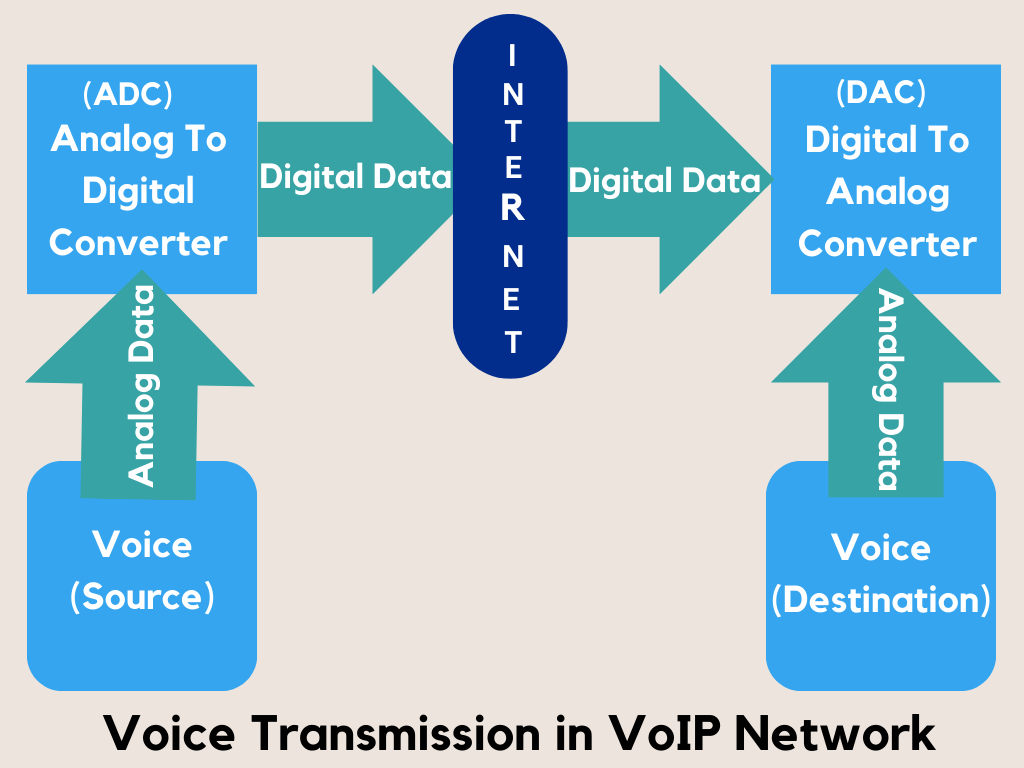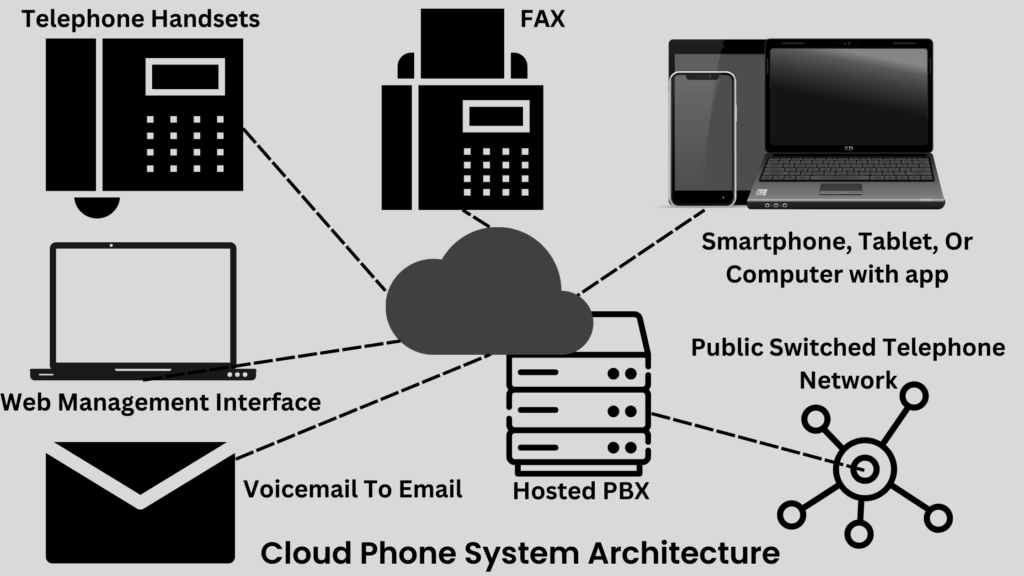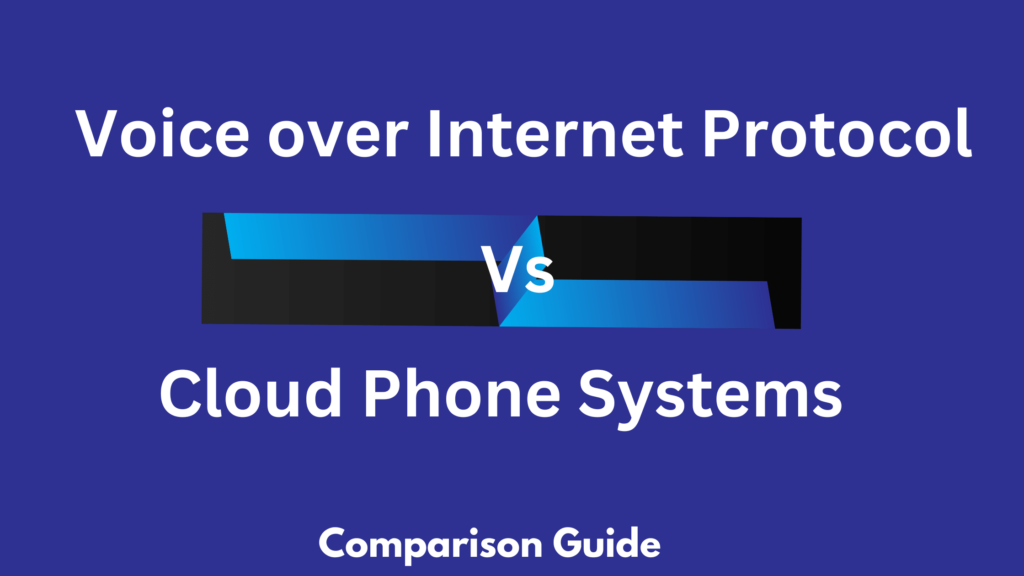In the time of digital telephony, businesses are faced with a decision: should they stick with traditional phone systems that are costly and inflexible, or should they opt for Voice over Internet Protocol (VoIP) and Cloud Phone Systems?
Both options promise to enhance communications, but which one is right for you? In this comprehensive analysis, we’ll explore the fundamental distinctions between VoIP and Cloud Phone Systems, equipping you with the knowledge to make the best decision for your business’s communication needs.
What is Voice over Internet Protocol (VoIP)
Voice over Internet Protocol (VoIP) is a technology that enables voice calls to be conducted through a broadband Internet connection, rather than relying on traditional landline or mobile networks. By converting your voice into a digital signal, VoIP allows you to effortlessly communicate directly from various devices such as computers, VoIP phones, or any devices connected to the Internet. With its convenience, VoIP has transformed the way we communicate, making it easier and more efficient than ever before.

Key features and benefits of VoIP
Some of the key features of VoIP are:
- Call Forwarding: VoIP allows you to redirect all requests to another destination, which can be another user or even an answering machine.
- Call Waiting: Just like in traditional telephony, VoIP supports call waiting, which allows you to put an ongoing call on hold to answer another incoming call.
- Caller ID: VoIP services provide caller identification, which displays the caller’s identification on the receiver’s device before the call is answered.
- Voicemail: VoIP services typically include a voicemail service that allows users to record messages for calls that are not answered.
- Conference Calling: VoIP supports multi-party calling, enabling multiple people to join in on a single call.
- Video Calling: High-quality video calling is another popular feature of many VoIP services, providing a more personal and engaging communication experience.
Benefits of VoIP:
- Cost-Effective: VoIP systems often offer lower calling rates, especially for international calls, because you’re essentially paying for data transfer – considerably cheaper than traditional telephone service rates.
- Increased Flexibility: VoIP services allow for easier integration with other technologies and systems. This means you can use voicemail to email transcription, allow employees to use their own devices, and numerous other integrations that enhance your existing business processes.
- Feature-Rich Operations: VoIP offers an extensive suite of features like call forwarding, conference calling, auto-attendant service, and more that typically cost extra on traditional telephone plans.
Related Reading: Benefits and limitations of VoIP
What is a Cloud phone system?
A Cloud Phone System (CPS), also known as a Virtual PBX (Private Branch Exchange), is a business phone system that is hosted in the cloud rather than on the premises of the company that uses the system. It hosts all your phone system’s call functionality, applications, and management and intelligence in the cloud, and you access these features and services over the internet.

Benefits of cloud phone system:
- Virtual Infrastructure: Instead of managing and maintaining an internal PBX, all the phone system components are hosted in the cloud by a service provider. This offers a high level of accessibility and redundancy as the data and routing information for calls are stored and managed remotely.
- Minimal Upfront Investment: Cloud systems typically require far less capital to set up, making them an attractive option for startups or businesses looking to minimize initial costs.
- Scalability: Just like with VoIP, you can effortlessly adjust the scale of your cloud-based phone service to meet the changing demands of your business.
- Ease of Management: With cloud systems, updates, and maintenance tasks are managed by the provider, saving your IT team valuable time and resources.
- Advanced Features: Cloud systems often come with advanced features and integrations, such as CRM (Customer Relationship Management) software compatibility, analytics, and AI-driven call routing and personalization.
The main differences between VoIP and Cloud Phone Systems
VoIP and Cloud Phone Systems refer to different aspects of modern communication technologies. Here are the main differences between the two:
1/ Infrastructure:
VoIP systems typically require on-site hardware, such as an IP PBX (Private Branch Exchange) and SIP (Session Initiation Protocol) trunking. These components manage voice and data traffic over your local area network (LAN) or wide area network (WAN). On the other hand, Cloud Phone Systems are entirely hosted in the cloud, meaning that all the necessary infrastructure is located off-site, and managed by a third-party provider.
2/ Scalability:
The scalability of your phone system can be a critical factor for future growth. VoIP scalability is limited by the capacity of your hardware, such as the number of phone lines your IP PBX can support. Cloud Phone Systems, on the other hand, are easily scalable. You can add or remove lines and extensions as your business needs change, with minimal disruption and without any hardware limitations.
3/ Cost:
Both systems come with their own set of financial considerations. VoIP typically has lower upfront costs since you can leverage existing hardware and infrastructure. However, maintenance and equipment upgrade costs can add up. Cloud Phone Systems, with their monthly subscription model, often incur higher upfront costs, but they generally have lower maintenance costs over the long term.
4/ Mobility:
In today’s mobile work culture, the ability to work from anywhere is a significant advantage. VoIP systems are typically limited to specific devices or software. At the same time, Cloud Phone Systems offer true mobility, allowing users to take calls on their office numbers from any location and device with an internet connection.
5/ Features:
VoIP systems may provide basic call features such as call waiting, call transfer, and voicemail to email. More advanced features require additional setup or third-party applications.
Cloud phone services often come with a range of advanced features (like SMS options, auto attendants, and video conferencing) as part of the package. Integration with business apps is also often seamless.
6/ Upgrades and Maintenance:
VoIP systems often require manual updates and maintenance. This maintenance can be time-consuming, especially if your on-site IT team has to manage the phone system alongside other responsibilities. In contrast, Cloud Phone Systems typically handle updates automatically, ensuring your system is always up to date with the latest features and security upgrades.
7/ Security:
The security of your phone system is a critical consideration, especially for businesses handling sensitive data. VoIP systems are vulnerable to hacking and unauthorized interception. Cloud Phone Systems employ various security measures, such as encryption and secure data centers, to protect voice data and communications.
8/ Support and Service:
The level of support and service you receive with VoIP can vary based on your chosen provider. You may have to pay extra for advanced support services. Comparatively, cloud providers often offer 24/7 support and service as part of their package. They can quickly scale their support to meet your business requirements.
What is the difference between VoIP and digital phone systems?
VoIP and digital phone systems can be critical for any business, as the right choice can greatly enhance communication efficiency. Here are the five primary differences:
1/ Data Transmission: VoIP converts voice into digital data and transmits it over the internet, while Digital Phone Systems, also known as Public Switched Telephone Networks (PSTN), transform voice into digital signals that travel through traditional phone circuits.
2/ Device Compatibility: VoIP services are highly versatile and accessible from any internet-connected device, such as smartphones, tablets, and computers. Conversely, Digital Phone Systems are primarily designed for use with specific hardware equipment, such as office phones.
3/ Cost: VoIP services are generally more cost-effective than Digital Phone Systems as they use existing internet infrastructure and avoid telephone network fees.
4/ Call Quality: The call quality of VoIP systems relies heavily on the reliability and speed of your internet connection, which can vary. In contrast, Digital Phone Systems offer consistently high call quality that isn’t dependent on the Internet.
5/ Flexibility: VoIP provides greater flexibility and scalability, while Digital Phone Systems offer superior reliability, particularly in areas with unstable internet connections.
To know more check out our detailed guide on: Digital phone systems vs VoIP
Use Cases and Scenarios
Ideal Scenarios for VoIP Implementation
Voice over Internet Protocol can offer tremendous benefits in certain scenarios. Here are some ideal circumstances for its implementation:
1/ Startups Looking for Cost-effective Solutions:
Startups often operate on a limited budget but still require a robust communication setup. VoIP is budget-friendly, eliminating the need for expensive traditional phone lines and offering a range of features at a fraction of the price.
2/ Companies with Multiple Office Locations:
For businesses with multiple office locations, VoIP supports connectivity. It centralizes communications, so no matter where you are in the world, calling a colleague is as simple as dialing an extension.
3/ Businesses with High International Call Volumes:
Traditional international calls are noted for their high cost. VoIP drastically reduces these expenses, making international communication more accessible for businesses.
When to Opt for Cloud Phone Systems
Here are a few situations when opting for cloud phone systems would be beneficial:
1/ Unified Communications (UC):
If your business utilizes other cloud-based collaboration tools and applications, a Cloud Phone System can seamlessly integrate with these services, providing a unified communication and collaboration environment.
2/ Remote Work:
If your team is distributed or working remotely, a cloud phone system allows everyone to stay connected from different locations. All that’s required is an internet connection.
3/ Scaling Business Operations:
Your communication needs will also expand as your business grows. Cloud phone systems are highly scalable – adding or removing users is a straightforward process, making them ideal if your business is experiencing rapid growth.
Now that you know the ideal scenarios to implement them, let’s discuss some factors to help you chose the right solution.
Choosing the Right Solution for Your Business
When deciding between VoIP and Cloud Phone Systems, several factors should be considered:
- Current Infrastructure: What is the state of your organization’s internet connectivity and in-house technology resources?
- Budget: What are your upfront versus ongoing budget allowances for a phone system?
- Scalability: Is your company in a growth phase, or is it more important to have a system that can quickly adapt to changes?
- Control Versus Management: Are you willing to take on the management of a more involved system for more control, or do you prefer to have a service provider handle most of the details?
- Special Requirements: Does your business have unique needs, such as video conferencing facilities or call center features?
Frequently Asked Questions
Q1) What are the disadvantages of cloud Telephony?
Ans: There are a few potential disadvantages of cloud Telephony you should consider:
- Cloud telephony services rely heavily on your Internet connection. Poor or inconsistent internet connection can lead to call drops, poor voice quality, and other service disruptions.
- As with any internet-based service, there is a risk of cyber attacks. It’s crucial to ensure your service provider has strong security measures in place to protect your data.
- The level of customization offered by different cloud telephony providers may vary. Depending on the provider, there might be limitations on the availability of settings that can be tailored to your specific business requirements.
Q2) What is a cloud VoIP?
Ans: Cloud VoIP, also called cloud-based VoIP, is a Voice over Internet Protocol technology in which the provider’s servers and hardware are hosted in the cloud rather than on-site. This eliminates the requirement for physical hardware, making it a cost-effective and flexible communication solution.
Q3) What is a cloud-based VoIP phone system?
Ans: A cloud-based VoIP phone system refers to a phone service delivered through your internet connection, where all the phone system’s data and features are stored on servers maintained by your service provider. This eliminates the need for on-site hardware and allows for features such as call routing, voicemail, and conferencing to be managed and accessed remotely via the cloud.

